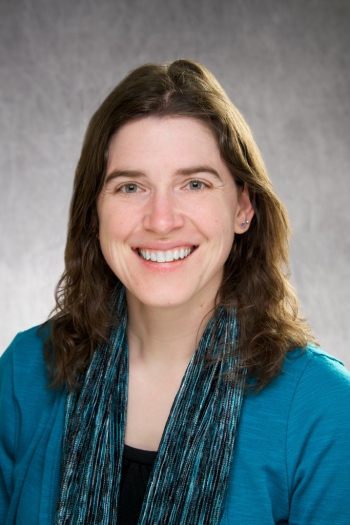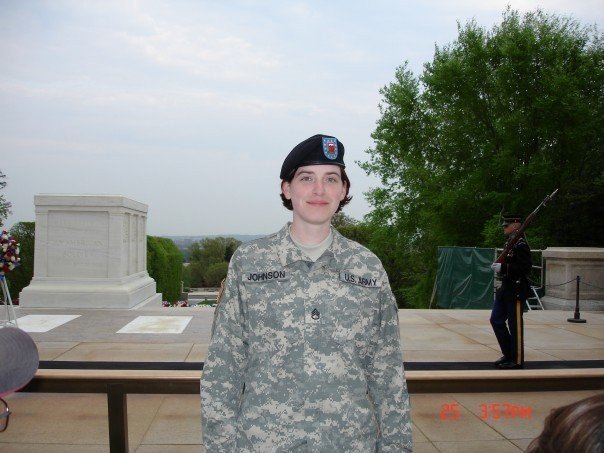The following feature is part of the series, VA Researchers Who Served. These profiles bring to life the critical work that VA researchers are doing for the Veteran community and highlight and recognize their military service, while including a touch of human interest and an inspirational tone.
Dr. Amy O’Shea, an Army Veteran, is a research health science specialist at the Iowa City VA Health Care System. As a biostatistician, she has carried out research on women’s health, observation care, infectious disease, kidney care and access to care. She manages complex administrative and health-related data from VA and Medicare sources using computer languages for data management and data analysis, while protecting data security and patient privacy. She’s also a research assistant professor at the University of Iowa and has authored or co-authored nearly 40 peer-reviewed papers. She served in the U.S. Army Reserve from 2001 to 2010 and from 2012 to 2013. Her military honors include the Army Commendation Medal, the Army Achievement Medal, the Army Good Conduct Medal.
What motivated you to join the military?

O’Shea carries out research on women’s health, observation care, infectious disease, kidney care and access to care.
When we were in high school, we could take a half day off to take the ASVAB, a test used to determine qualification for enlistment in the U.S. military. My brother was a year behind me and took the test a year after I did. The recruiter called to speak with him and got me instead. When he asked to meet, I said sure, because I didn’t have much else on my plate. After a year abroad, I was just waiting to start my undergraduate studies. Anyway, after speaking with him, I decided to join the military, mostly for the educational benefits. The Army Reserve had a tuition assistance program on top of GI Bill benefits, and after my deployment of 2004 to 2005, my GI Bill benefits increased. I also chose a military occupational specialty that would allow me to work a good-paying summer job.
What inspired your research career?
I’m not sure that I was so much inspired as much as I fell a bit into a research career with a combination of luck and effort. I was working toward a bachelor’s degree when I scored well on a statistics exam. Because I did well, my professor suggested grad school. He told me I could go for free, and I thought, ‘Why not get more education?’ I applied to several programs and ultimately became a biostatistics student at the University of Iowa, where I worked for several years as a graduate research assistant. I really fell in love with working in health care and moving care forward based on science.
When and where did you serve in the military? Describe your military experience.
Initially, I served with the United States Army Reserve in St. Cloud, Minnesota. I was a technical engineer, which means that I learned how to do so soils testing, drafting and surveying. (I think it’s funny that I now work on a totally different kind of survey as a researcher.) I deployed with the 367th Engineer Battalion to Afghanistan, where I mostly worked building airfields and performing surveys to ensure proper drainage. When I came to graduate school at the University of Iowa in 2013, I transferred to the 300th Engineer Detachment in Dubuque, Iowa, where I served as the non-commissioned officer in charge until I left the service.
What kinds of research are you involved in? How does it potentially impact Veterans?
As a biostatistician, I have worked in different research areas, including women’s health, observational care, infectious disease and kidney transplantation. I am currently wrapping up a project with VA’s Office of Connected Care that studies associations between patient characteristics, broadband access and neighborhood social disadvantage, as well as the delivery of primary or mental health care before and during the COVID-19 pandemic. My work focuses on access to care, especially care delivered through telehealth for rural and underserved populations. My goal is to ensure that all Veterans have equitable access to VA care.
More Information
Click here to read the full story.
Click here to learn more about VA research.
Topics in this story
More Stories
Watch the Under Secretary for Health and a panel of experts discuss VA Health Connect tele-emergency care.
The 2024 National Veteran Suicide Prevention Annual Report provides the foundation for VA’s suicide prevention programs and initiatives.
Theranostics is a specialized field of nuclear medicine that uses a two-pronged approach to diagnose and treat cancer.







Great story. I also had the GI Bill from 4years as a Navy Officer. After a Masters at UNCG, I also attended and graduated from The University of Iowa with the help of lab and teaching work. My area was measurement in physical education.